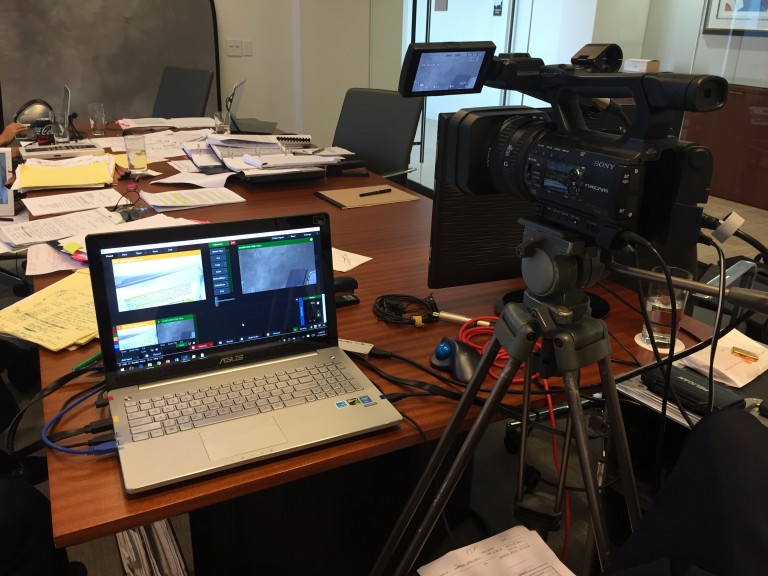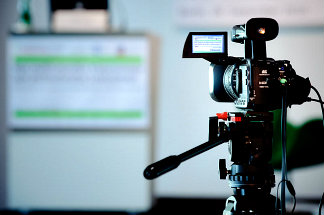The Value of Legal Video Clip Depositions in Modern Legal Solutions: What You Ought to Know
Lawful video depositions have actually ended up being essential in today's legal landscape. They supply a multidimensional sight of witness testimonies that typical records just can not match. By recording both verbal and non-verbal interaction, these depositions enhance the general understanding of a witness's trustworthiness. However, the effectiveness of video clip depositions hinges on numerous variables, including compliance with lawful standards and ideal practices (legal video depositions). Discovering these aspects discloses their true significance in modern legal solutions
What Are Lawful Video Depositions?
Lawful video clip depositions function as a crucial tool in the litigation process. They include taping witness testaments in a video clip layout, catching both spoken and non-verbal interaction. This approach allows attorneys to record the attitude, expressions, and reactions of witnesses, giving a richer context for the testimony. Normally conducted in a regulated environment, these depositions are led by attorneys who ask concerns while a stenotype reporter records the dialogue. The resulting video can be critical for test prep work, as it makes it possible for legal representatives to analyze the reliability of witnesses and fine-tune their strategies. Furthermore, lawful video clip depositions can be used in various lawful contexts, ranging from civil disagreements to criminal cases. The aesthetic and auditory elements of video depositions enhance the presentation of evidence, making it a crucial element in the contemporary legal landscape. In general, they contribute considerably to the effectiveness and performance of legal procedures.

Advantages of Video Depositions Over Standard Methods
Video depositions use various benefits contrasted to standard approaches of taking witness testimonies. One considerable benefit is the ability to record both aesthetic and audio components, offering an extra complete record of the witness's declarations. This dual format improves clearness and permits lawyers to reference particular nuances during trial prep work. Furthermore, video clip depositions help with remote participation, making it easier for witnesses who may be inaccessible for in-person looks because of geographical restrictions or health issues.Moreover, video depositions can accelerate the general deposition process, lowering the moment and costs related to travel and logistics. They additionally enhance ease of access, as tape-recorded depositions can be conveniently shared amongst lawful teams and referenced at any moment. This convenience adds to much better situation management and prep work. Generally, video depositions stand for a modern, effective method to gathering witness statements, lining up with the evolving requirements of the lawful occupation.
The Function of Body Language and Tone in Testimonies

In legal video depositions, body language and tone play vital roles in sharing a witness's reputation and trustworthiness. Nonverbal hints can offer understandings into a witness's emotion, influencing just how their statement is regarded. Understanding the impact of these elements is necessary for jurors and lawyers alike when assessing the integrity of a testimony.
Nonverbal Communication Insights
While spoken communication is usually highlighted in legal testimonies, nonverbal hints such as body movement and tone play a vital function in communicating integrity and emotion. Observers of depositions may keep in mind that a witness's position, gestures, and face expressions can substantially affect perceptions of dependability. Regular eye contact may signal self-confidence, while staying clear of look could suggest dishonesty or discomfort. The tone of voice-- its pitch, speed, and volume-- can give sensations of sincerity or uncertainty. Lawful specialists have to be attuned to these nonverbal signals, as they typically supply vital context that enhances talked words. Recognizing these subtleties can improve the effectiveness of depositions and affect the end result of legal process.
Emotional Tone Impact
The psychological tone shared throughout legal testimonies considerably impacts exactly how a witness is viewed. Body movement, vocal inflections, and faces play essential duties in forming the story of a testament. A witness exhibiting self-confidence via steady eye call and a tranquil tone can impart a sense of dependability and interaction. Conversely, indicators of anxiety, such as fidgeting or an unstable voice, might bring about hesitation regarding their account. The subtleties of emotional expression can affect the analysis of facts, making it crucial for attorneys to identify these signs. In video depositions, the aesthetic and auditory components integrate, stressing the significance of psychological tone in sharing sincerity and reliability within the legal procedure.
Reputation and Dependability
A crucial consider establishing trustworthiness and dependability during testimonies hinges on the witness's body movement and tone of voice. Viewers frequently count on non-verbal hints-- such as eye get in touch with, position, and motions-- to analyze a witness's sincerity. A witness that keeps eye call and displays open body language might be viewed as more reputable and sincere than one that prevents eye contact or appears shut off. Additionally, intonation plays an important role; a consistent, calm tone can enhance the reputation of the statement, while changes in pitch or volume might raise questions. Inevitably, the combination of body movement and vocal tone substantially affects just how a witness's statements are obtained and translated in a legal context.
Best Practices for Performing Video Depositions
Conducting video depositions calls for careful planning and implementation to ensure a clear and efficient presentation of testimony. It is vital to pick a peaceful, well-lit area to lessen disturbances and protected optimal video high quality. The equipment must be checked in breakthrough, including cameras, microphones, and illumination, to avoid technical problems during the deposition.Next, parties involved should assess the format and procedures in advance, making sure that every person recognizes their roles. The deponent needs to be informed on the process, including how to react clearly and concisely.Additionally, preserving an expert attitude throughout the session is crucial. This includes avoiding speaking over each other and confirming that all inquiries are routed suitably. Ultimately, it is vital to tape the deposition in a format that permits very easy playback and evaluation, protecting the stability of the testament for future use.
Lawful Factors To Consider and Conformity Issues
Exactly how do legal considerations and compliance issues impact the performance of video clip depositions? Lawyers must navigate a complex landscape of policies, guaranteeing that video depositions abide by jurisdictional policies and criteria. Compliance with legislations worrying personal privacy, permission, and taping methods is vital. For circumstances, getting explicit consent from all parties entailed is needed to stay clear of lawful repercussions.Additionally, the admissibility of video evidence in court can pivot on compliance with step-by-step requirements. Making sure that the tools utilized fulfills technical requirements is also vital, as low quality can threaten the deposition's reliability.Moreover, lawyers need to recognize any kind of particular state laws that regulate video clip depositions, as these can differ substantially. Failure to resolve these factors to consider can not only jeopardize the honesty of the deposition but likewise influence the general instance strategy, ultimately impacting the client's lawful end results.
Exactly How Video Depositions Impact Court Perception
While video clip depositions can act as powerful tools in lawful procedures, their impact on jury perception is substantial. The visual and acoustic components of video recordings give jurors with an extra comprehensive understanding of witness demeanor, credibility, and psychological reactions. This multimedia approach can enhance the jurors' capacity to analyze the reliability of testament contrasted to conventional text-based transcripts.Moreover, video clip depositions permit jurors to observe body movement, tone of voice, and facial expressions, every one of which her response can influence their interpretation of the witness's declarations. The existence of a witness on display can humanize them, fostering empathy and connection, which might persuade jurors' viewpoints. On the other hand, a witness who shows up unreliable or incredibly elusive on video clip may lead to adverse understandings that affect a jury's decision. Eventually, the vibrant nature of video clip depositions plays a vital duty in forming just how jurors interpret evidence and reach their decisions.
The Future of Video Depositions in Legal Technique
As advancements in innovation remain to reshape the legal landscape, the future of video clip depositions is positioned for substantial evolution. Innovations such as man-made knowledge, digital reality, and enhanced video clip conferencing devices are expected to simplify the deposition procedure and improve availability. Legal specialists may use AI-driven analytics to examine witness credibility and situation strength a lot more effectively.Moreover, the assimilation of online fact might allow juries to experience immersive simulations of depositions, giving much deeper context and understanding. Additionally, the fad toward remote depositions is likely to linger, providing higher adaptability for attorneys and clients alike.As remote job becomes increasingly stabilized, video clip depositions will likely come to be standard method, decreasing expenses and time restrictions associated with typical approaches. On the whole, these technological advancements assure to improve the performance, performance, and availability of video depositions in lawful technique, eventually changing just how attorneys prepare for test.
Regularly Asked Questions
Exactly How Much Do Lawful Video Depositions Normally Price?

Can Video Clip Depositions Be Made Use Of in Any Type Of Type of Situation?
Video depositions can be utilized in different kinds of instances, including civil, criminal, and family regulation. Their versatility enables lawyers to present witness testimonies efficiently, adjusting to the certain requirements of various lawful circumstances.
What Equipment Is Required for a Video Clip Deposition?
To perform a video deposition, vital tools includes a high-quality video camera, microphone, lighting, and a reputable recording tool. Furthermore, a computer system with editing and enhancing software might be required for post-production and formatting the last video.
How much time Does a Common Video Deposition Last?
A regular video clip deposition lasts in between 2 to 4 hours, depending upon the complexity of the case and the number of concerns positioned. Prolonged sessions might take place, yet breaks are usually integrated for participant comfort.

Are Video Clip Depositions Admissible in Court?
Video clip depositions are usually permissible in court, supplied they stick to legal standards and regulations of evidence. Their use improves quality and preserves witness testament, helping in the judicial procedure during tests and hearings. Lawful video clip depositions have become crucial in today's lawful landscape. Additionally, legal video depositions can be used in different legal contexts, varying from civil disputes to criminal situations. Furthermore, video clip depositions facilitate remote engagement, making it much easier for witnesses that may be not available for in-person looks due to geographical restraints or wellness issues.Moreover, video clip depositions can accelerate the general deposition procedure, lowering the time and expenses linked with travel and logistics. Ensuring that the tools used fulfills technological criteria is additionally important, as inadequate top quality can undermine the deposition's reliability.Moreover, attorneys should be aware of any kind of details state laws that regulate video clip depositions, as these can differ substantially. Additionally, the trend toward remote depositions is likely to linger, using higher flexibility for clients and attorneys alike.As remote work useful link comes to be significantly normalized, video clip depositions will likely become conventional method, minimizing expenses and time restrictions associated with conventional methods.